PRESERVING A MILITARY LEGACY FOR FUTURE GENERATIONS
The following Reflections represents RM2 Robert Krasevec’s legacy of his military service from 1967 to 1973. If you are a Veteran, consider preserving a record of your own military service, including your memories and photographs, on Togetherweserved.com (TWS), the leading archive of living military history. The following Service Reflections is an easy-to-complete self-interview, located on your TWS Military Service Page, which enables you to remember key people and events from your military service and the impact they made on your life. Start recording your own Military Memories HERE.
Please describe who or what influenced your decision to join the Navy.

My uncle was in the US Navy on PT boats in the Pacific during WWII! My best friend’s uncle was on an aircraft carrier during the Korean War. After talking to them, I knew I could train for 4 yrs in the navy and get a good civilian job afterward. Thanks to my dad drilling it into me, I always thought about my future. We took a battery of tests in boot camp, and I scored high in math and science.
The navy offered me to be a Corpsman! I said I am 6’4″, and you want to put a big red cross on me, oh no! Then I was asked to be a Radioman, Sonarman, or Radarman! I picked Radioman because I could get a civilian job anywhere in the country. The navy asked me if I had any influential relatives like a politician, Admiral, General, etc. I said no, but my PT boat uncle worked for NASA as an engineer on the landing excursion module (LEM) fuel tanks that would land on the moon.
Well, that opened a lot of doors for me, and I found myself later being the single-sideband HICOM radio operator at SACLANT for Admiral Ephriam P. Holmes 1968-1970!
Whether you were in the service for several years or as a career, please describe the direction or path you took. What was your reason for leaving?
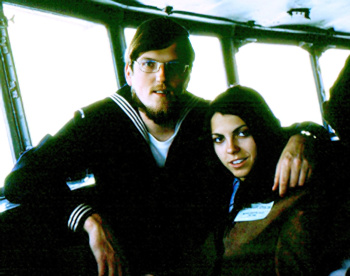
I served four years active and two years inactive reserve. After radio school, as I said, I went to SACLANT, CINCLANT, CINCLANTFLT Admiral Holmes (3 titles) in Norfolk, Virginia! I served 2 3/4 years there.
Then it was time for rotation, and the Admiral, who I got to know quite well, asked me what I wanted on my dream sheet, of which I had to go to sea duty. I said I would like to be on an Admiral’s Staff on a carrier in the Atlantic. He got me orders for President Kennedy ex-naval aide Rear Admiral Tazewell T. Shepard being one of his staff Radioman onboard his flagship USS Wasp CVS-18. I saw a good part of the Atlantic side of the earth, from the Arctic to the Antarctic, from the Caribbean to the Mediterranean. Hunting Russian submarines!
I left the service because I found the right girl to marry and settle down with. We have been married now for 48 years!
If you participated in any military operations, including combat, humanitarian and peacekeeping operations, please describe those which made a lasting impact on you and, if life-changing, in what way?
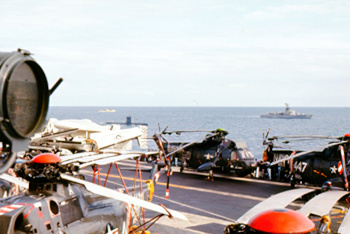
April 1968- received a distress call from a US destroyer that had a sailor that needed surgery, and they were too far away in the Atlantic. I called our command-post watch officer (CPWO) and requested a surgeon. We together found Admiral Holmes, personal surgeon, and the COMSECONDFLT surgeon on board the USS Springfield in Norfolk harbor. I patched them through to the airwaves, but the Corpsman on the destroyer could not hear them. I then proceeded to be the intermediary and passed instructions for the surgery to be done by the Corpsman. It took 8 hours to complete, and I lost my voice for a few days.
While this was going on, the Supreme Allied Commander Admiral Holmes came into the radio room with NATO Generals and Admirals on a tour. He asked what I was doing and was very impressed when I told him. Chief Burnside also commented that I was the architect of the plan being used. The next day Admiral Holmes had me come to his office and thanked me for saving the sailor’s life.
May 27th, 1968- the submarine USS Scorpion was missing with 99 men aboard! We were coordinating the search and rescue operation. I was on duty and had all the different commands on my radio net calling for the USS Scorpion, trying to make contact. One of the Radioman on my network called the call signs backward, and it sounded like the Scorpion was calling.
Everyone got excited and started calling the sub, but no answer was received. I recognized the voice calling and told Admiral Holmes that the Radioman in Puerto Rico mixed up the callsign sequence. He told me to verify it, so I called the Radioman via telephone, and he was scared to admit it but did so when I said I would speak to the Admiral on his behalf. We were all tired, and a mistake was made. Admiral Holmes was understanding, but the newspapers got wind of the transmission mistake via ham radio operators who were listening. The incident was explained to the media, and two listening stations that recorded the sounds of an implosion found the Scorpion. The coordinates were given to deep salvage submarines, and the USS Scorpion was found and photographed off the Azores. Ninety-nine men were now confirmed dead.
August 1968- received a distress call from the USS Mobile saying a civilian engineer, who was part of the acceptance trials of the new USS Mobile, was having a heart attack. I called for a helicopter from Oceana Naval Air Station to pick him up and take him to Portsmouth Naval Hospital. The man unfortunately died!
Around February 1971, the USS Wasp was sent on a mission to support the attack carrier USS John F. Kennedy to go to the island of Cyprus and take off US citizens. The reason was Greece and Turkey were fighting over ownership of Cyprus, and shooting started. We were fired upon and had some of the windows of the Admiral’s bridge shattered while the Admiral and I ducked for cover! The Admiral sent our jets to return fire and lit up the hillside where we were receiving firing from. The firing on us stopped immediately!
This episode caused our port visits to Naples, Italy, Athens, Greece, Istanbul, Turkey, Haifa Israel, and Alexandria, Egypt, to be canceled. We did get to the island of Malta to refuel and then on to Barcelona, Spain. Then we headed for home Quonset Point Rhode Island, on February 24th, arriving on March 3rd, 1971.
Did you encounter any situation during your military service when you believed there was a possibility you might not survive? If so, please describe what happened and what was the outcome.
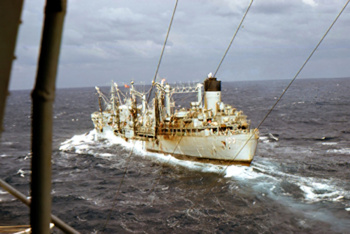
June 1970- I almost fell overboard! It happened one evening whIle I was goIng to the Admirals staff storage locker under the port side (left) flIght deck towards the bow of the shIp. The lIghts In the passageway were burned out, and It was completely dark. I was lost but could hear the ocean breaking off the bow of the shIp. Moving towards the sound, I lifted my leg to go outside through the hatch (doorway) to find out where I was! The shIp hIt a big wave, and my foot got caught In the doorway. I fell hIttIng some chaIns that lIned the catwalk of the carrIer as I went overboard. With one hand, I grabbed one of the chaIns and was now six stories above the water watchIng the bow cut through the ocean. Where my strength came from, I don’t know. I couldn’t even do a pull-up In school, but now I got an adrenaline rush, and I grabbed another chaIn wIth my other hand and jerked myself up onto the catwalk and hatch openIng. It seemed lIke hours, but I lay there for 30 mInutes, waitIng for my heart to stop from jumpIng out of my chest. I was totally exhausted.
August 10th, 1970- the Wasp set saIl agaIn for the Norwegian sea! We saIled north of Scotland through the Shetland Islands. I was on duty one evening and heard over the loudspeaker, fIre, fIre near the main magazIne (thIs Is where the ammunItIon and nuclear weapons were kept). More and more fIre partIes were called as the fire raged. It was now midnight, and I was goIng to my sleeping quarters, whIch I shared wIth 40 other saIlors of the Admirals staff.
SIttIng on my bunk, I heard the call to man abandon ship stations. No one was getting up because the speakers were turned down low. I was screaming and shaking guys awake to get dressed and man the abandoned shIp statIons. There was a mad scramble to put on warm clothes because we were near the arctIc cIrcle. We went to the hanger bay elevator that brought up planes to the flight deck and instructed that we would jump from five storIes to the water. The loudspeakers throughout kept us Informed as to how things were goIng. The CaptaIn of the Wasp had the maIn magazIne compartment flooded to avoId any explosIon and set off the nuclear weapons!. No swImmIng for us that day, thank God!
October 11th, 1970- We got underway for Guantanamo Bay, Cuba, to pIckup detachment 18 from the Fleet TraInIng Group. We left Cuba for the Bermuda area when all of a sudden we lost three engInes and boIlers! For days, we drIfted whIle the engIne crew trIed to repaIr the engInes. We were In the Bermuda trIangle! No one could take showers, and we dIdn’t have hot food, etc. The boIlers operated all the equipment, plus our fourth engIne was not used because of fear of burning it out, and we wanted It for emergency only.
Finally, the engInes were repaIred, and we had drifted so far off course (near Africa) that we needed an oIler to meet us when we got near the US coast. The oiler, USS Chuckawan, approached us, but a storm was coming. We only had enough fuel to reach Norfolk, Virginia If we dIdn’t refuel. Admiral Shepard said we would not abort our mIssIon to go to the Mediterranean. Prepare to refuel! Our shIps were sIde by sIde after some remarkable seamanshIp by the captaIn of the Wasp, and the refuelIng lInes were pulled over to the Chuckawan. The rules for refuelIng were that the USS Cuckawan steers a straight course, and the Wasp adjusts her steerIng to keep the safe distance. If the shIps come close together, an emergency breakaway Is sounded, and the Chuckawan drops our refuelIng hoses over the side, and the Wasp turns away from the oIler. I watched the refuelIng take place when the bows of the two ships started to come near each other. Emergency breakaway was sounded, and both shIps turned. Cables snapped and whIpped towards the Wasp’s elevator that was down level wIth the hanger bay and had saIlors on It watchIng the refuelIng. Three saIlors were cut In half by the cables so cleanly that theIr bodIes just folded over onto theIr lower torso and legs. It was horrible! Then the superstructure of the Chuckawan hIt our elevator and had Its gun tub and whaleboat sheered off, just mIssIng theIr smokestack.
If the smokestack had been hIt there would have been an explosion, whIch would have blown both shIps to oblIvIon! Three of the USS Wasp saIlors dIed In thIs accIdent. The fault was the Chuckawan’s for turnIng and the Wasps for not having that elevator pulled up flush agaInst her sIde. The Wasp was ordered to Boston for repairs, and I got to go home again for a whIle.
Of all your duty stations or assignments, which one do you have fondest memories of and why? Which was your least favorite?
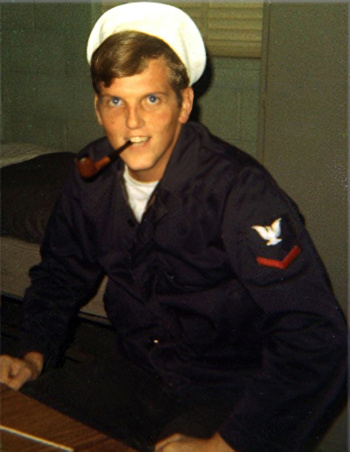
March 1968-upon graduation from radio school, I was given the best orders the school has ever seen, Supreme Allied Commander Atlantic, CINCLANTATL, CINCLANTFLT (Commander in Chief Atlantic and Commander in Chief Atlantic Fleet). Admiral Ephraim P. Holmes was the second-highest admiral in the U.S. navy. I was proud, and I was scared.
The base was hidden in a residential area in Norfolk, Virginia. It had five mansions on it and a large hospital building during the war. Another new-looking large building held the fleet intelligence center where all the codes were developed. There were nato headquarters buildings and other base support buildings. I did notice the tennis courts and golf course. It looked like a country club, but for Admirals! I was assigned to the radio staff barracks, which was new and air-conditioned (yessss), and was told to put on the dungaree uniform and report to the message center. After indoctrination, I was shown what job I would perform. My job was to print classified messages using two types of printing presses. I slaved away full of ink all over my uniform for two months and said this has got to change. During my off time, I sat in the single sideband radio station we had. It was the second most powerful radio station in the navy.
Following Dad’s advice, I learned everything about that radio. One day, the chief in charge, a radioman, Senior Chief Burnside, came in while I was sitting there and said, ” Who are you and what are you doing here? I told him I was one of the printers and was interested in doing the radio job, and on my off time, I was sitting in on all the radio shifts to learn. He asked the radioman on duty if this was so, and he said yes. Chief Burnside said do you think you can do this job right now? I said yes, and he told the duty radioman to get up and let me take over. I did all the radio checks properly and explained how everything worked to the chief. He said, son, you are now on my radio staff!
The radio operator for the supreme allied commander had to maintain ten networks by radio checking with all commands every hour. He had to make sure every command was loud and clear. If not, change the frequency till all commands are. Satellite communications and different transmitting stations were also used. The radio operator made phone patches by electronically connecting the phone call onto the airwaves. He would also pass coded traffic (messages) to various commands and coordinate war game exercises. The radio room was located in the old navy hospital I had mentioned earlier, right under a church steeple in the middle of the hospital. In the steeple was our omnidirectional antenna hidden from view. We had top Generals of the Marine Corps, Strategic Air Command of the U.S. Air Force, the U.S. Army, Admirals of various U.S. Navy commands, the Coast Guard, and NATO on these ten networks.
The people who I spoke to and used the radio patch service were the President of the United States (Johnson and Nixon). The Secretary of Defense (McNamara and Laird), the Supreme Allied Commander, and politicians who had clearance from the President’s office. Our radio network was one alternate that the President could use during times of war and was kept at 100% efficiency. This assignment, I felt, was the most incredible job I would ever have! It tested me to the utmost of my abilities and gave me the confidence to take on any and every situation the future would bring! Now the least favorite was printing top-secret messages! It was dirty and tiring work, but I did my best to accomplish this assignment!
From your entire military service, describe any memories you still reflect back on to this day.
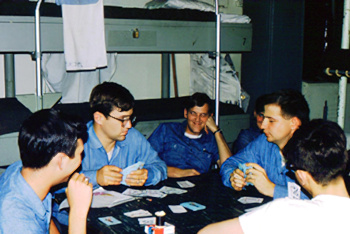
Oh, there were so many, but it was the navy men I served with that I reflect on! So many personalities and diverse people from all over the United States. As the new guy, they were happy to show me around, answer any questions I had and show me how to do my job! I really appreciated that!
What professional achievements are you most proud of from your military career?
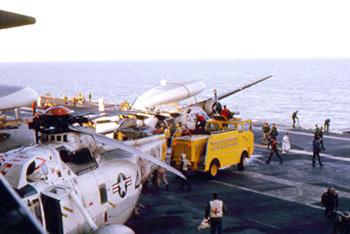
I was able to become a Fiber Optic Transmission Engineer with the knowledge I gained in the US Navy. I was hired by the New York Telephone Company. My resume’ of my military background helped me to climb the ladder to success faster than the average person.
Of all the medals, awards, formal presentations and qualification badges you received, or other memorabilia, which one is the most meaningful to you and why?
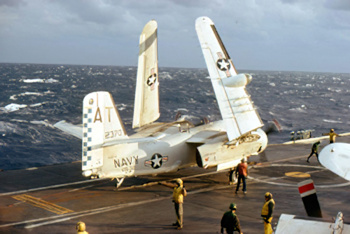
On June 8th, 1970, we arrived in Rota, Spain, near Cadiz. I went to Jerez de la Frontera, where sherry is made, and tasted all of them!
The Wasp left a few days later for exercises in the mid-Atlantic up to Scandinavian waters. During this time, we were on a top-secret mission to track the Russian’s newest submarine, which they claimed was so quiet that no one could track it. We laid in wait above the Arctic Circle north of Murmansk, Russia. The Russian sub came out, and we dropped sonobuoys between Greenland and Iceland, Iceland to Scotland, and across the English Channel. No matter how the Russian submarine went, we would have contact and put a ring of sonobuoys around it! The USS Wasp went to the South Atlantic and sent her planes up to keep track of the Russian sub. Our planes would land in Greenland or the US to refuel and keep tracking the sub all the way to off the coast of Norfolk, Virginia. We then let the USS Intrepid keep track of the Russian submarine. Meanwhile, the Russians couldn’t figure out who or how we tracked them.
We were supposed to be awarded the Presidential Unit Citation, but it was downgraded to the Navy Unit Commendation ribbon. We all were proud just the same!
Which individual(s) from your time in the military stand out as having the most positive impact on you and why?
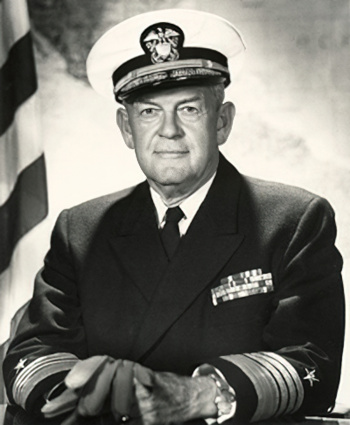
I got to know Supreme Allied Commander Admiral Ephraim P. Holmes really well! He was impressed with me as his HICOM radio operator! He would come into the radio room and close the door, and we would speak of New York, where he was also from. I was on the CINCLATFLT basketball team, and he would watch some of our games from time to time. He liked sports, and I could tune in to New York radio stations to listen to sports and music, etc. Here was a full Admiral just talking to a sailor like a father would to his son. It was really nice of him! I would tell him what happened on the HICOM network that day, and he always reminded me that no one but the President could pull rank on me as had happened often. He said, “Bob, you represent me as 4-star Admiral when in this radio room! I said, do, “Do I get a pay raise too”? He laughed and said a firm “no”! Admiral Holmes taught me that no matter who you are, to treat people with respect and kindness. I respected him so much, for he was my positive impact in the Navy!
List the names of old friends you served with, at which locations, and recount what you remember most about them. Indicate those you are already in touch with and those you would like to make contact with.
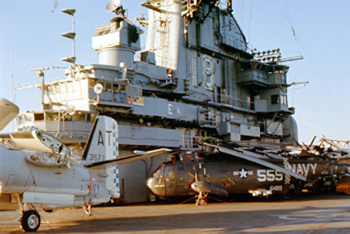
I was friends with fellow Radioman Joe Ascioti, who was on the CINCLANTFLT basketball team. He had been on the Syracuse University basketball team and taught me to play the center position as his backup on the team. He was from Syracuse, New York, and was 6’6″ tall, and I was 6’4″ tall. We had a lot of laughs on that team. Sadly Joe passed away a few years ago!
Another shipmate was Benny Ray Walters from Kentucky as another Radioman on the COMCARDIV14/COMASWGRP 2 Admiral’s staff on the USS Wasp CVS-18. He was a great guy and helped me learn my new job and how to get around the ship. He had been on the previous cruise we were on now and told me about the ports we were going to, what hotels to stay at and where to eat! It was great being pals with him.
Can you recount a particular incident from your service, which may or may not have been funny at the time, but still makes you laugh?
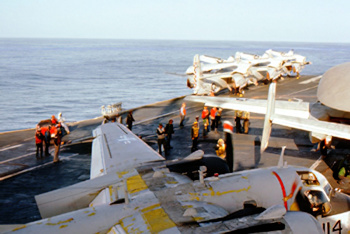
When I was on the CINCLANTFLT basketball team, we practiced from 3 pm to 8 pm twice a week! We would miss mealtime, so we went to the Giant supermarket in Norfolk to eat at their restaurant after practice. They had each nite all you can eat fried chicken one day then all you could eat pizza and meatballs and spaghetti other days.
Here comes 12 tall men who were starving, and we always ate their food supply till it was exhausted. The manager of the restaurant tried to put up the closed sign a few times when we would come! We went to the Giant food store manager, and he would force the restaurant manager to open, and we told him to keep the food coming! After practice, we always laughed and said, let’s go make the guy cry again!
What profession did you follow after your military service and what are you doing now? if you are currently serving, what is your present occupational specialty?
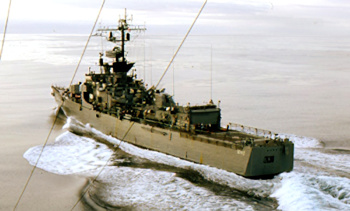
I stayed in communications and worked my way to being a fiber optic telecommunications engineer. I retired with a pension and now live in Dawsonville, Georgia!
What military associations are you a member of, if any? what specific benefits do you derive from your memberships?
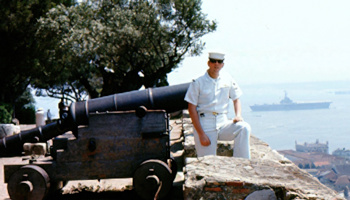
I was a member of the Veterans of Foreign Wars in Conyers, Georgia, for a few years, and I moved to Dawsonville, Georgia, to be in the mountains. I used the discounts that you could get and listen to war stories from the members. I told the story of the Battle of the Texas Bar in Barcelona, Spain, when some Marines threw beer bottles at our heads when we entered the bar! It was just a skirmish and ended up being as friendly as it can be between Marines and Sailors.
In what ways has serving in the military influenced the way you have approached your life and your career? What do you miss most about your time in the service?
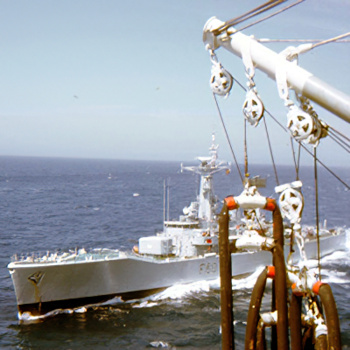
Serving in the US Navy gave me maturity confidence and taught me that I could do anything in life!
I miss most the adventure that I had in serving my country. One minute I am talking to Presidents and other famous people in my radio room, and the next minute I am sailing the oceans on the USS Wasp and seeing many countries!
Based on your own experiences, what advice would you give to those who have recently joined the Navy?
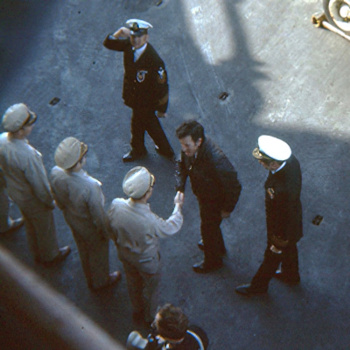
Get as many navy schools as you can, study, and pass your tests while moving up in rank! It is very rewarding to be a leader and accomplish assignments given to you!
In what ways has togetherweserved.com helped you remember your military service and the friends you served with.
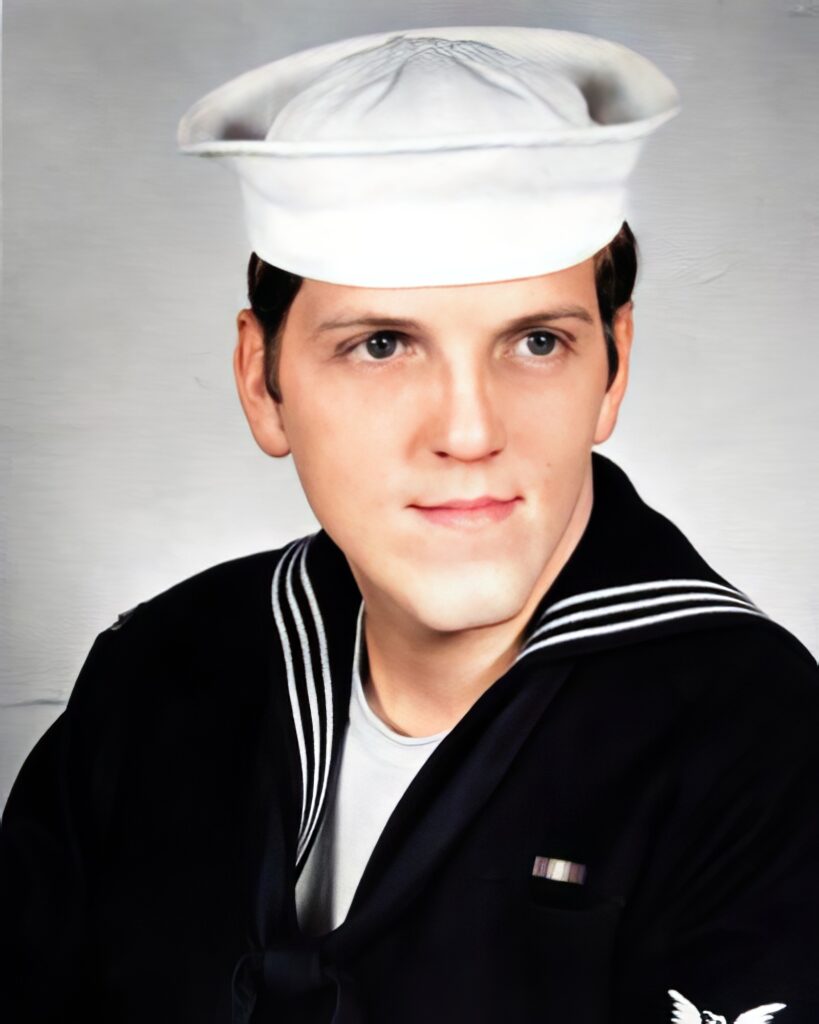
I love the timelines of other Sailors and what they went through! It is also lovely to see how the Navy is progressing. The US Navy is strong and should stay that way for peace on earth.
I wish all Veterans a Happy 2022!
PRESERVE YOUR OWN SERVICE MEMORIES!
Boot Camp, Units, Combat Operations
Join Togetherweserved.com to Create a Legacy of Your Service
U.S. Marine Corps, U.S. Navy, U.S. Air Force, U.S. Army, U.S. Coast Guard

0 Comments